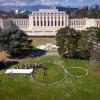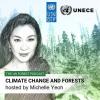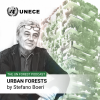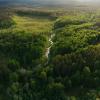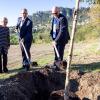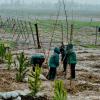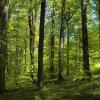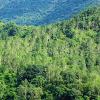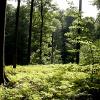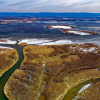Forestry Press Releases
Displaying Results 1 - 25 of 127
The UNECE Trees in Cities Challenge, a global effort to enhance urban greening, reduce extreme heat events and improve air quality, has reached a significant milestone. Since its launch in 2019, the initiative has facilitated the planting of 18.5 million trees in cities worldwide, more than double
In a world grappling with the escalating crisis of global warming – evidenced by the accelerated melting of glaciers worldwide – the imperative for action has never been greater. Carbon dioxide emissions from fossil fuel combustion are the foremost contributor to global warming, accounting for a
Cities are a major driver of climate change, responsible for an estimated 75% of all carbon dioxide emissions globally. With two thirds of humanity projected to live in cities by 2050, cities are at the center of climate action. We need solutions to reduce urban greenhouse gas emissions and
The world is falling behind on lowering global carbon emissions. We only have a narrow chance of limiting global warming to 1.5°C above pre-industrial levels (Intergovernmental Panel on Climate Change Sixth Assessment Report) or as the United Nations Secretary-General says, “our world needs
A systemic change is needed to provide a safe and healthy working environment for the estimated 33 million people working in the forest sector worldwide, according to a new report from the Food and Agriculture Organization of the United Nations (FAO), the International Labour Organization (ILO) and
Trees belong in cities. Yet, as cities across the globe get bigger, trees and green spaces are lost to new buildings and infrastructure. With less than 20 percent of ground area covered by tree crowns, on average, cities all over the world need many more trees than they have today.
But why? Why do
Boreal forests are finally making the news. Also referred to as snow forests and taiga, they are the world’s largest land ecozone, spanning over Canada, China, Finland, Japan, Norway, Russian Federation, Sweden and the United States and constitute one of the planet’s largest carbon sinks, holding
During the past two weeks, over 10,000 delegates have attended the second part of the Conference of Parties (COP-15) of the UN Convention on Biological Diversity (CBD) in Montreal, Canada, as they seek to agree on the post-2020 Global Biodiversity Framework. Unsurprisingly, forests are at the
Global biodiversity is now declining faster than at any time in human history. As leaders gather for the 15th Conference of Parties to the Convention on Biological Diversity (COP-15, 7-19 December), UNECE calls for the region to urgently step up with the leadership needed to stop biodiversity loss
For many people in economically well-developed countries of the UNECE region a wood stove or fireplace used to be a cosy way to heat a room in the cold season. This winter, however, the role of wood energy may dramatically change for many people out of sheer necessity.
A large part of the UNECE
As cities grow, urban planners and city administrators face daily challenges in maintaining healthy, sustainable, liveable, and resilient urban environments capable of contributing to a good quality of life for city dwellers.
The 80th Session of the UNECE Committee on Forests and the
On the occasion of United Nations Economic Commission for Europe’s 75th anniversary, the Joint UNECE/FAO Forestry and Timber Section is launching a photo contest in partnership with the Forest Stewardship Council (FSC) on the theme of “From woodland to woodwork: a photo contest to mark 75 years of
75 years ago, the United Nations Economic Commission for Europe (UNECE) started working on forests. Today, we recognize their enormous potential not only for humans, fauna, flora, and the environment, but also for cities. In an urbanizing world, the contribution of forests to cleaning our air and
Desertification, water scarcity, droughts, and the shrinkage of the Aral Sea are some of the challenges that Uzbekistan faces due to climate change. Given their vital role in regulating ecosystems, protecting biodiversity and landscapes, and supporting livelihoods, trees and forests are at the
Geneva, Lausanne, Nice and Bordeaux are among the latest cities to make tree planting and urban forestry management pledges to support greener, more sustainable and more climate resilient cities as part of the United Nations Economic Commission for Europe (UNECE) Trees in Cities Challenge.
Geneva
Spending extended periods of time at home under COVID-19 restrictions highlighted the need for accessible green spaces like never before, particularly for city dwellers who sought out green spaces for fresh air, exercise and a break from the confines of their apartments. Access to
Protecting and restoring forests, as well as unlocking their potential to ensure livelihoods, green development, and a more sustainable outlook for humanity, were key points discussed during European Forest Week and Foresta2021 by the Joint Session of the UNECE Committee on Forests and the Forest
The impacts of climate change on forests will be profound. Yet global emissions reduction models rely on the ability for forests to both sequester carbon and scale up production of innovative new products that can replace emissions-intensive materials used in construction, textiles and energy
Today, more than 2 billion ha of lands globally are deforested and degraded causing competition for scarce land and natural resources, hunger and threats to livelihoods. Major causes, particularly, in Eastern and South-Eastern Europe are linked to pests, diseases, droughts, forest fires, wind
Globally, 690 million people suffer from hunger and three billion cannot afford healthy, nutritious food. Despite this, the Food and Agriculture Organization of the United Nations (FAO) estimates that one-third of all food fit for consumption is either lost during the production or shipping process
The COVID-19 pandemic spread around the world at lightning speed, devastating cities and communities and prompting a lockdown. The lockdown period also provided some respite for nature, resulting in memorable sights of ‘nature unlocked’ in our urban habitats.
To immortalize such sights and to
With a pledge to plant almost 83,000 new trees, Moscow became the first city in Russia to officially commit to the initiative launched by the United Nations Economic Commission for Europe (UNECE) in 2019.
As one of the world’s megacities with a population of over 12 million, Moscow is globally
More robust monitoring and measuring systems are required to meet the Sustainable Development Goals (SDGs), according to a UNECE report on Measuring and Monitoring progress towards SDGs that uses a “nexus” approach to chart a course for more “joined up” activities.
High-quality statistics
Localizing the Sustainable Development Goals at the urban level is crucial to deliver on the 2030 Agenda, stresses UNECE in a new report that advocates for a “cities-based” and “people-smart” approach to sustainable development.
With cities today as the driving force in economic,
UNECE calls for integrated and sustainable natural resource use through a "nexus" approach
The use of material resources, fuelled by economic and population growth, urbanisation and societal changes, has increased more than ten times since 1900 and is set to double again by 2030. The annual global extraction of materials has increased from 27 to 92 billion tonnes since 1970, while the


